சக்தி விகடன் -
26 Jun, 2010
Part 1
Posted Date : 06:00
(26/06/2010)
ஸ்ரீரமண மகரிஷி
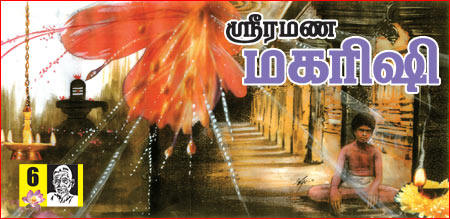
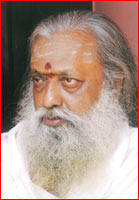
To know a matter in depth, one needs the help of another (teacher or Guru). The explicator of such knowledge is ‘Āćārya’ and ‘Guru.’ The one who teaches knowledge is Āćārya.’ He who makes you realize wisdom is Guru. Since it needs close proximity, many regard the father as Āćārya and Guru.
But Venkatraman at his tender age lost his father. Because of his death, the family broke up, and members went to different places. There was an urgency that the older brother should remain a guide to the 16-year-old Venkatraman. The older brother Nagasamy thought he carried the responsibility for Venkatraman’s welfare, schooling, and employment. He mentored and monitored him. Often, he was counseled and corrected. That caused a conflict between the siblings. The perception by Venkatraman that no one was there to guide him but a brother was there to find fault with him was hard on him. 2
Doubts can be cleared by anyone capable of explaining. Who can Venkatraman trust to share his thoughts, and ask questions about life, death and the remarkable changes caused by them in his mind and psyche? If he shared his thoughts, would he be the object of ridicule? If the ridicule, leveled against him, affects him, and if he without intention ridicules his wondrous experience (explained later), he feared the negative consequences. Because of that possibility, he did not reveal his experience to anyone, kept it in the recess of his mind and remained calm.
The mind of man is the observer of the phenomenal world; the imagination makes the observed even bigger than what it is. Among men, these matters take a life of their own. The mind gets entangled. 3
Venkatraman was an introvert and never an extrovert. After he experienced the death of his father, he became more introspective about death and dying. He made self-inquiry and realized what dies and what never dies. He experienced, realized and received a vision of that which never dies. Guarding against extroversion, his mind held fast that which he saw within himself, what he realized, what remained stable inside, and that which has no attributes. 4
Who instructed Venkatraman on these things? He had no ‘Guru.’ He never asked God with opposed palms, ‘This I need.’ 5
He enquired into ‘Who Am I?’ (self-inquiry). He had his heart and mind in his inquiry. He explored the Truth. He delved deep into himself without distraction or dissipation to study what in truth happens inside of him. He saw a change in him. That change was a great bequeathal, Pūrvajaṉma Vāsanas (fragrance or past life’s delayed effects of auspicious nature) a great bliss enjoyed by a great sage. 6
Tirugñāṉasambandar received Prasada of breast milk from Ambāḷ: The grace could be of this nature. 7
Holding fast to the Truth, Sattva pervades the inside and increases manifold. All colors have their individual qualities. White has no attribute or quality. What stands with no attributes (Sattva) pervades and rules supreme. (God’s constitution is Sattva.) 8
When Tirugñāṉasambandar (TS) found no sign of his father upon his submersion in the temple tank, the shock inside of TS revealed the Truth or Sattva. 9
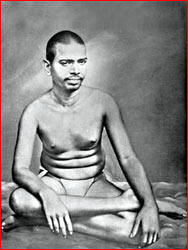 Who
am I? What is after death? Venkatraman cogitated about these questions,
as he was lying on his back in a small room. Because of his Truth,
Sattva or God’s grace descended on him (Sakthinipātham = descent of
Grace). A seed sown in the ground a long time ago became a seedling, and
then a tree with branches and since forgotten, dropped fruit on the lap.
10
Who
am I? What is after death? Venkatraman cogitated about these questions,
as he was lying on his back in a small room. Because of his Truth,
Sattva or God’s grace descended on him (Sakthinipātham = descent of
Grace). A seed sown in the ground a long time ago became a seedling, and
then a tree with branches and since forgotten, dropped fruit on the lap.
10Could an introspector be involved in affairs of the phenomenal world? Yes, it is possible: eating, dressing, sleeping… But all those are different and on an alternate pathway. The ingested food, seen by the eyes, smelled by the nose, inducing salivation in the mouth, and satiating the hunger is phenomenal. (He does not live to eat. But he eats to live.) Ingesting without the mind of an epicure or gastronomer is of another kind. 11
When the mind clings to its own element, all else is forgotten. Out of modesty, we wear clothes, that shows no ostentation. They won’t show off and do not invite compliments. 12
That sleep is a different kind. Though the body sleeps, the soul is awake. The soul is also a witness and apprehends its own nature. It experiences. Allowing this, what happens to the external behavior? The mind, becoming relaxed, stands aside and equipoised, and chooses a modest path. 13
Venkatraman always sought solitariness. The yen (longing) for play disappeared. The competitive spirit to win at any cost dissipated. All endeavors turned inside. Solitude was the name of his game. But, will the world leave him alone? The disputes are multitudinous. 14
The brother angrily slashed him with sharp words, “Read! Study the books. That is the reason for your birth!” In Venkatraman's mind, a question popped up, “Is that so?” The wonder in him swelled, “It is for this, we are born.” 15
Finding no escape, he opened the lazy books to lull and satisfy others. The mind had no interest in books. The contents of the book leave no impress on his mind. The mind was introspective on matters other than mundane books. 16
The aunt called on him, saying, “Go to the city water pipe at the corner of our street and bring me water in two vessels.” 17
Previously, he hated doing it. He even became angry. He used to tell, “Aunty, you extract work from me only.” That was then and not now. 18
He goes to the far side of the street, fills the vessel with water, returns home carrying it on his shoulder and pour it in a huge caldron. He does this about three times, fills the container and again sits in his room with the books. 19
If he wanders during the day, the fatigue impels him to lay down on the floor. The mind as a witness watches the body on the floor. That witness, not taking a wink of sleep, remains awake always. The body rested well. The soul, being tranquil and equipoised, was awake. 20
The sky’s Piramāṇḍam (Brahma’s Egg = Universe) had an attraction for him. All Puranas declare, “God the Inner Abider, appeared in the sky.” 21 Won’t you appear for me now? Would you not stand before me as the Purana-fame Ṛṣapārūḍar with Ammai and call me, ‘Venkatramā?’ His mind aches for the moment, when he runs towards him (God), saying, “What, did you call me?” 22
Venkatraman goes to temple. 23
The hastiness of the mind with which he used to jump from one shrine to the next after wearing Vibhūti and Kum-kum at each shrine abated. Temple is not the place for hastiness or an amusement park. Optimal mental state, proper place, and devout Darśan help ensure closeness to God. Whether the primary deity is Nataraja or Ammai, the message (Divine Wisdom) from either deity will in a flash descend into your soul. The dance with raised leg: you will know its merit and understand how the sculptor could infuse limitless ecstasy into the idol. 24
Mind to mind talk is convergence; inspiration and expiration are convergence; seeing and apprehending an object are convergence; two people talking is convergence; paying homage is convergence; going from the sun to the shade is convergence and vice versa. How else do you say it? What other words do you use to describe it? 25
Śiva and Lingam are one identity. The objects of the world interact and merge in an uninterrupted fashion. 26
Before Mīnākṣi Amman temple shrines, Venkatraman sobbed from the perspective of ‘self’ looking towards ‘God.’ It was neither tears of grief, nor tears of ecstasy. It was an event depicting the merger of the individual self with the Universal Self. The individual self becomes all and enjoys ecstasy.
Let us receive Darśan. 27
----------------------------------------------------------------------------------------------------------------------------------------------------------------------------------
சக்தி விகடன் - 26 Jun, 2010 Part 2
தொடர்கள்
Posted Date : 06:00 (26/06/2010)
கருணை தெய்வம் காஞ்சி மகான் Kanchi Mahan is deity of mercy.
 Author: Sarukesi
Author: Sarukesi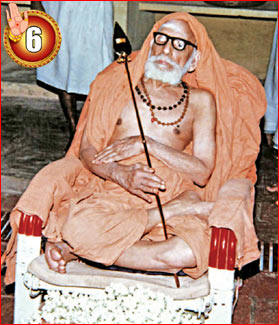 Though
Periyava goes to all Temples on his pilgrimage, the citizens of
Chidambaram for a long time had a complaint. ‘Periyava did not come to
our town. Do you know how Periyava addressed and made good on their
complaint? That said, Lakshminarayanan continued his narrative.
Though
Periyava goes to all Temples on his pilgrimage, the citizens of
Chidambaram for a long time had a complaint. ‘Periyava did not come to
our town. Do you know how Periyava addressed and made good on their
complaint? That said, Lakshminarayanan continued his narrative. “That was 1933. Periyava took the pilgrimage on foot to Chidambaram. There are two Yantras in Chidambaram: Pañchātsara Yantra and Aṉṉa Ākarṣaṇa Yantra, which were worshipped by Ādisankarā after consecration.
Ādisankarā’s Guru was Govinda Bhagavat Pāthar; Supreme Guru, Kauda Pāthar. He was the pupil of Pathañjali Muni. Sthala Puranam states that Śiva-Nataraja not only gave Darśan to but also performed a sacred dance for Patañjali Muni and Vyāghrapāda Muni. Chidambaram is Bhūlōka Kailāsam, which was not a creation of anyone.
All right …Let me come to Periyava.
About 250 years ago, the Āćāryas of Sankara Mutt and Chidambaram Dīkshitars had a dispute. The Dīkshitars told the Āćāryas should receive the Vibhūti upon their offer. They added, “Dīkshitars, that we are, belong to Kailāsa Parampara. We earned the right to dispense Vibhūti for others to receive." That was their argument.
The Mutt members said, “Our Jagatguru will not extend his hand to receive anything that is contrary to our tradition.” That is the opinion of Kanchi
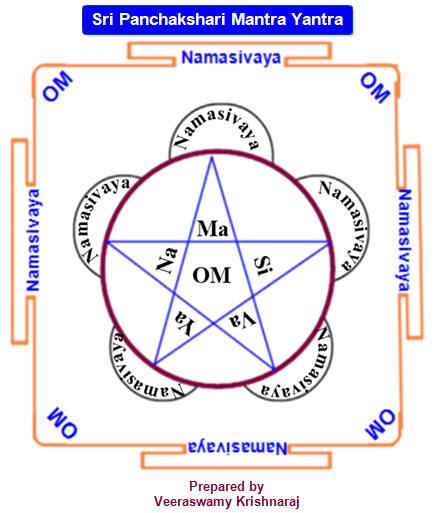 Sankara Mutt.
Sankara Mutt.The Dīkshitars were adamant, and the Kanchi Mutt Āćāryas never go to Chidambaram Temple. They receive Darśan from outside and leave the premises on their way to other towns and villages. This was what happened for years on end.
In 1933, Dīkshitars, whatever their thought was, expressed their desire to invite Periyava. The local citizens yearned for Periyava should be invited to the Temple.
Dīkshitars’ request reached the ears of Periyava. Periyava was of the desire to forget about the bitter events of the past and start an amicable relationship anew and expressed his willingness to go the Chidambaram Temple. Kāñchi Mahāṉ transcends resentment and is a deity of mercy (in human form).
Periyava came to Chidambaram leaving behind the past rancor, not of his making. It was early in the morning. Not telling anyone (of his identity) he went straight to the Temple in a rush (like the wind-god).
There, he took ritual dips in the sacred pond, performed the daily religious austerities and went straight to the shrine of Nataraja.
It was at that moment Uṣat Kāla (Break of Dawn) pūjā was about to begin. Dīkshitars, on seeing Periyava, were surprised. They were ecstatic as if Parameśvara was there in person offering Darśan. Seeing him at such proximity, they were beside themselves in joy, looking like fixed statues.
Thereafter, they regained their composure, performed Pūrṇa Kumbha rituals, paid homage to Periyava without faux pas and received his blessings.
The Madurai people got wind of Periyava’s visit to the temple and came in droves into the temple. They had Darśan of Periyava and stood around in a state of horripilation and anxiety. People were waiting for this opportunity for many years. ‘Will this event not happen? No way, it did happen. Are we not blessed and satisfied to see with our own eyes, Kanchi Mahan? They were happy that their prayer was answered. The happiness of seeing him showed on all faces.
Periyava did not leave the temple right away because coming to Chidambaram after a long hiatus over many generations, was accomplished, and the
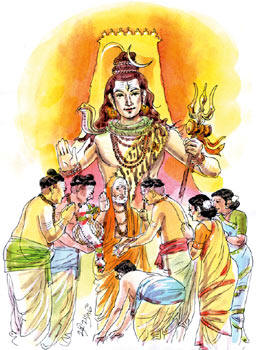 people received the Darśan. He stayed in the 1000-pillar Mandapam for 15
days and delivered sermons. Chidambara Dīkshitars and the people were
immersed in supreme happiness.
people received the Darśan. He stayed in the 1000-pillar Mandapam for 15
days and delivered sermons. Chidambara Dīkshitars and the people were
immersed in supreme happiness. Kānchi Māhaṉ is a mature Jñāṉi. For a visit to Koil, the credit goes to Periyava. For 250 years the head of the Mutt never once went to the Chidambaram Temple. He did not consider he would create problems by visiting the temple. There is a proverb: 'The great man does the impossible.’ He was the perfect example of that proverb.
When Periyava obtained Darśan of Nataraja Peruman, he made a solemn vow to make a coat of mail for the raised foot with nine kinds of diamonds.
Twenty years later, Periyava applied the Navaratna Kavasam to the raised leg of Lord Nataraja and made good on his vow.
Do you know the day of that event?
Tiruvāthirai! (= the sixth nakṣatra, a day sacred to Śiva.)
Dīkṣitars were all exhilarated. Their faces lighted up and showed that happiness. Lakshminarayanan said, “The people of Chidambaram were beside themselves seeing the Lord of Dance Nataraja Peruman’s diamond-studded Kavasam as an adornment.
- தரிசனம் தொடரும்
Darsan will Continue.